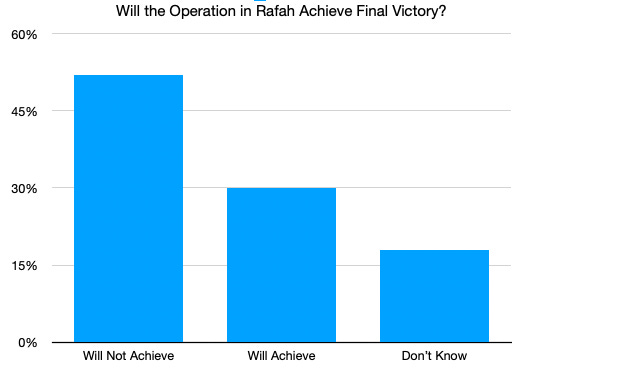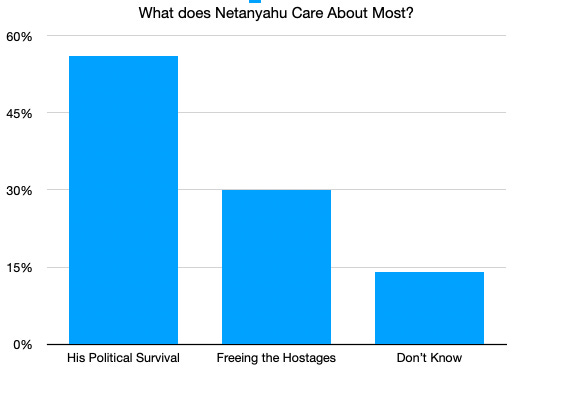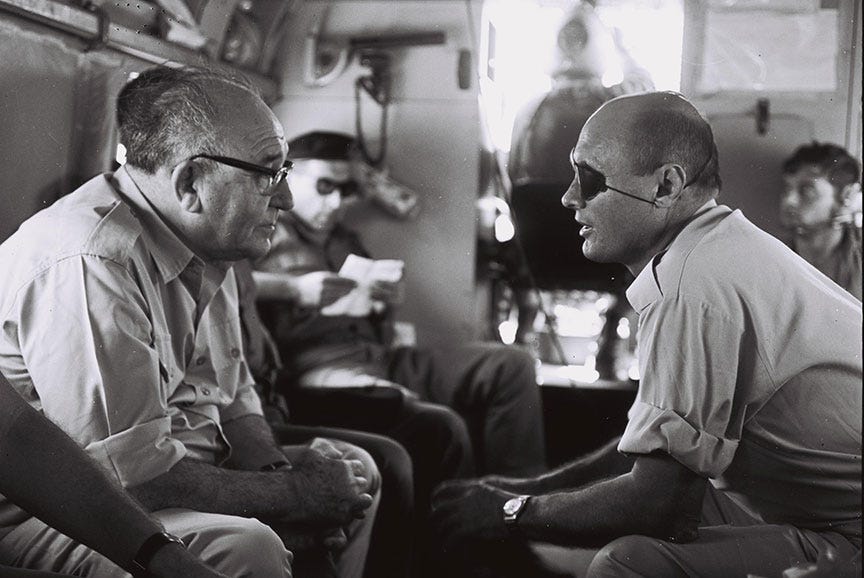DAY 214 OF THE WAR: What Deal Did Hamas Agree to? Israel At Rafah Crossing, Poll Results, Biden Speaks on Antisemitism
Tel Aviv Diary May 7, 2024
DAY 214 OF THE WAR
With daylight this morning, many things that were unclear last night have become much clearer. First, what was the meaning of the affirmative response that Israel received last night from Hamas? It turns out that Hamas changed the terms of the agreement. Although the changes are small, these substitutions have a major impact. The first notable alteration is that, instead of releasing 33 hostages in the first phase, the altered agreement now calls for the return of 33 live hostages or hostage remains. That is not acceptable.
Second, the original Egyptian plan, which Israel had agreed to, included mutual veto power over the Palestinian prisoners to be released. The new version Hamas put forward allows them to pick who they want to be released—and they undoubtedly want some of those who raped and burned Israelis on October 7th released. Again, this is something we simply cannot permit.
Finally, the version of the agreement Hamas approved altered the agreed-upon conditions for ending the war. In the original proposal, this would only happen during the second phase. Still, according to Hamas’s proposed deal, Israel must agree to the end of the war before the women soldiers are released (during the first phase).
There are other differences between the original proposal Israel accepted and the version Hamas approved, i.e., the pace of hostage releases. It has been reported that some of the gaps between the two proposed deals can probably be overcome. Despite the fact that the Hamas’s alterations to the proposal are all non-starters for Israel, nevertheless, the overall response was at least an answer. In the next few days, we’ll find out whether Hamas’s positive response was designed to attempt to delay the IDF entry into Rafah or if it was indeed an opening for further negotiations. Tonight, the White House expressed optimism that an agreement can be reached.
At the break of day, we also learned what the IDF did last night during its entry into Rafah. Israeli troops moved 3.5 kilometers into Gaza, reaching the Rafah crossing on the Egyptian border. The plan seems to be pressuring Hamas by depriving it of one of its most critical revenue streams: control over the movement of people and cargo through the border. This also blocks the ability of Hamas to leave Gaza (except through secret tunnels). Israel will need to devise a plan quickly to distribute food and other essential goods that must continue passing through the crossing. There was one report asserting that Israel agreed to turn over the logistical control to a private US firm
.
Tonight, the White House stated that Israel had informed the U.S. that the Rafah operation is limited and aims to stop the flow of money and weapons to Hamas. Defense Minister Gallant declared that we will continue to slowly advance in Rafah until we either end Hamas rule or the first hostage is released.
Late this afternoon, 30 rockets were launched from the Khan Younis area at the Israeli communities around Gaza, of which Iron Dome intercepted half, while the other half fell without causing any casualties.
This evening, twelve rockets were fired from Rafah to Reim, Kissufim, and Ein HaShlosha. The Air Force later destroyed the launchers.
Tonight, it was announced that Lior Rudaeff (61) from Kibbutz Nir Yitzchak was killed on October 7th and that Hamas is holding his body. Rudaeff was considered until today to be a hostage of Hamas
.
IN THE NORTH
Today, there were six attacks on the North by suicide drones. One drone was shot down, while another crashed into a target, causing damage. In the evening, five anti-tank missiles were fired at Metullah and Shtulah, causing damage but resulting in no casualties. Tonight, there were rocket attacks once again on the Northern border at Kiryat Shemonah. In addition, it was announced today that two soldiers were killed yesterday by a suicide drone: Master Sergeant (Res.) Dan Kamkag (31) and Master Sergeant (Res.) Nahman Natan Hertz (31).
Last night, the Air Force intercepted a drone sent from Iraq. Tonight, the Air Force downed another drone launched from Iraq, headed for Eilat.
NEW PUBLIC SURVEYS
Channel 13 conducted a new series of public opinion surveys. The first graph shows how people would vote if elections were held today. It indicates the strengthening of support for Netanyahu. However, according to pollsters, the results of this survey are slightly misleading. The Meretz and Labor parties are shown running separately and not receiving enough votes to meet the threshold to enter the Knesset. The two left-wing parties will ultimately merge and earn at least five seats. In addition, the percentage of Arab voter turnout calculated in this survey is considerably below the actual anticipated turnout, so the expectation is that the Arab parties will receive more seats than indicated in the graph presented below
.
WEST BANK
Here is the statement released by the Army Spokesman detailing IDF actions in the West Bank today:
Sayeret Haruv, Duvdevan, Shin Bet, and Border Police forces completed a more than 20-hour operation last night in the Tul Karm area of the Menashe Brigade. Over the course of the operation, the troops destroyed three bomb factories, and engineering units uncovered several explosives buried under the roads.
During exchanges of fire, the forces eliminated an armed terrorist and arrested six other wanted individuals. Additionally, the troops located and confiscated dozens of weapon parts and military equipment and searched over 60 buildings in the area.
In the Dura area of the Judea Brigade, the fighters arrested a suspect who assisted a terrorist who attacked Gan Yavne. In the Hawara area of the Samaria Brigade, the forces arrested a wanted individual and located and confiscated tens of thousands of shekels of terror funds. In the Al-Bireh area of the Benjamin Brigade, materials for producing propaganda for terrorist organizations were confiscated. The detained suspects have been transferred for further investigation by security forces, with no casualties to our troops.
So far, since the beginning of the war, about 4,000 wanted individuals have been arrested across the Judea and Samaria Division and the Jordan Valley and Valleys Brigade, with about 1,700 of them linked to the Hamas terrorist organization.
BIDEN AT THE CAPITOL’S YOM HASHOA COMMEMORATION
President Biden spoke at a Holocaust memorial at the Capitol today. Speaker Johnson and Minority Leader Jeffries both delivered excellent, impassioned, and supportive speeches. The two Congressman from each side of the aisle were followed by Biden, who, spoke from the heart and shared from his life experience. Among other things, the President stated:
This ancient hatred of Jews didn’t begin with the Holocaust. It didn’t end with the Holocaust either. Or after — even after our victory in World War II. This hatred continues to lie deep in the hearts of too many people in the world and requires our continued vigilance and outspokenness. That hatred was brought to life on October 7th of, 2023. On the sacred Jewish holiday, the terrorist group Hamas unleashed the deadliest day of the Jewish people since the Holocaust. Driven by ancient desire to wipe out the Jewish people off the face of the Earth, over 1,200 innocent people, babies, parents, grandparents, slaughtered in a kibbutz, massacred at a music festival, brutally raped, mutilated and sexually assaulted.
ECONOMY
One area in the Israeli economy that has demonstrated resilience during the war is exports to developing countries. This is evidenced by the increased demand for credit risk insurance from Israeli exporters since the beginning of the "Iron Swords" war. According to Ashra, the Israeli company for foreign trade risk insurance, during the first quarter of 2024, the company provided principal approvals for state-guaranteed export transactions for approximately 3.1 billion shekels, an increase of about 10% compared to the corresponding quarter last year.
Approvals were given for export transactions in infrastructure, energy, agriculture, security, engineering, health, and other sectors to countries such as Gambia, Angola, Ivory Coast, the Dominican Republic, Kazakhstan, Georgia, and others. In addition, applications for credit insurance were submitted for export transactions totaling over 2.2 billion shekels, which are currently under review, including to countries such as Liberia, the Dominican Republic, Togo, Benin, Malawi, and Uganda.
BUSINESS
In an exceptional vote of confidence in the Israeli economy, the cyber security company Wiz announced that it has raised a funding round of one billion dollars. This represents the largest private funding round in Israel’s history. The overwhelming majority of this sum will go to the company's coffers, with a secondary sum consisting of tens of millions of dollars, to allow early Wiz employees to sell shares in the company.
The current funding was conducted at a valuation of 12 billion dollars for Wiz, a 20% increase compared to the 10 billion dollar valuation during a 300 million dollar funding round announced by the company in February 2023. This represents a relatively moderate increase in value compared to the rapid valuation jumps the company has recorded in the past: in October 2021, it raised at a valuation of 6 billion dollars, and six months prior, in March 2021, it announced a funding round at a valuation of 1.7 billion dollars. The current fundraising was led by two new investors and one existing investor. The new investors are the American funds Andreessen Horowitz and Thrive Capital. The existing investor is Lightspeed, which is also an American fund. The fundraising also included participation from the funds Greylock and Wellington Management—both additional new investors—alongside existing investors.
Opmed.ai, a company that developed a system for managing hospital resources, raised 15 million dollars from funds including NFX, Grove Ventures, Secret Chord Ventures, and Sir Ronald Cohen. Additional investors participating in this round were Unbox Ventures of Migdal Shamir Holdings and Bar-Ilan University. Opmed.ai was founded by Dr. Mor Brockman-Melzer (CEO), an entrepreneur with a background in resource management at the Ministry of Defense. During her doctoral studies on information systems at Bar-Ilan University, she collaborated with Professor Baruch Barzel (Director of Science), head of the laboratory, to study the dynamics of complex networks from the Department of Mathematics to address operational challenges in complex systems. Brockman-Melzer moved to Boston, and they were joined by Avi Paz (Chief Technology Officer and leader of operations in Israel), a graduate of the IDF's elite "Mamram" program, who previously served as a cloud architect and senior developer in Microsoft's health division.
Tuesday, Akamai Technologies (USA) announced the official acquisition of the Israeli startup Noname Security, which specializes in securing Application Programming Interfaces (APIs), for $450 million. The negotiation was first reported last month on TechCrunch. Akamai reports that the acquisition will add $20 million to its revenue this year. Noname Security was founded in 2020 by Oz Golan (CEO) and Shai Levy (former CTO who has since left the company). A year later, Noname became one of the symbols of the tech bubble of those days, raising $135 million at a valuation of one billion dollars. The startup became a unicorn when its annual revenue was only a few million dollars. Therefore, the latest deal represents a reduction of over 50% from the startup's last valuation.
––––––∞––––––∞––––––∞––––––∞––––––∞––––––∞––––––∞––––––
A PIECE OF HISTORY
Events Leading to the Six-Day War
In both October and November of 1966, there was an uptick in terrorist activities originating from Syria and Jordan. During that period, Syrian artillery consistently targeted kibbutzim (collective settlements) situated beneath the Golan Heights. In April 1967, Israel retaliated by launching an aerial assault on Syrian positions in the Golan Heights. On April 7th, an air battle ensued in which Israel shot down six Syrian aircraft. Subsequent to this incident, the Israeli government cautioned that it would undertake further military actions if Syrian-backed terrorism persisted. In response, the Soviets fed the Egyptians false intelligence, alleging that Israel was amassing troops for an assault on Syria. Egypt remained wary despite Israeli refutations and confirmations of their innocence by U.N. ground observers.
By May 14th, while Israel marked its Independence Day, Egypt had its armed forces on high alert and began relocating troops to Sinai. In reaction, Israel initiated a partial call-up of its reserves. On May 16th, the head of the Egyptian armed forces, General Muhammad Fawzi, penned a letter to the United Nations Emergency Forces Commander, seeking the removal of U.N. forces from the border. Subsequently, on May 18th, Egyptian Foreign Minister Mahmoud Riad asked the U.N. to evacuate all its troops from Egyptian territories, including the Gaza Strip. U.N. Secretary-General U-Thant concurred and proceeded with the withdrawal. In the meantime, Israel intensified the call-up of its reservists.
On May 22nd, Egyptian President Nasser declared the Gulf of Aqaba closed to all Israeli vessels, provocatively stating, “The Jews threaten war; we tell them we are ready for war.” The next day, Israeli Prime Minister Levi Eshkol labeled the closure of the straits a breach of international law and an act of aggression against Israel. Concurrently, US President Johnson articulated,
The United States regards the Gulf as an international waterway and believes a blockade against Israeli shipping is illegal and could seriously undermine peace. The right to free passage in international waterways is a fundamental interest of the global community.
Nevertheless, a UN Security Council Resolution condemning the blockade was thwarted by a Soviet veto.
While this was transpiring, the US endeavored to assemble an international flotilla to reopen the Straits of Tiran. Regrettably, most countries refrained from participating, compelling the US to abandon the initiative. On May 28th, after Abba Eban returned from the US, the Israeli cabinet held an extended session. Contemplating whether to grant the US more time or approve a preemptive strike, the cabinet leaned towards patience. This was a challenging decision, especially as Israel's prolonged army mobilization was unsustainable. With memories of the Eichmann trial still fresh and fears of another Holocaust rising, Eshkol's subsequent speech, emphasizing diplomacy, was poorly received, inciting calls for a new government.
On May 29th, Nasser proclaimed,
The matter isn't about Aqaba, the Straits of Tiran, or UNEF today. It's about the rights of the Palestinian people and the 1948 aggression against them. We demand complete rights for the people of Palestine.
On May 30th, King Hussein of Jordan arrived in Cairo and entered into a defense pact with Egypt, effectively placing Jordanian troops under Egypt's command in the event of a conflict.
By June 1, a new Israeli government was formed that integrated opposition parties, with Moshe Dayan assuming the role of Defense Minister. The prevailing sentiment was clear: the US couldn't assemble a viable international initiative, but it would understand if Israel decided to act.
My weekly radio show:












I wish the mainstream press would cover this war as thoroughly and honestly as you have been doing. I have been following your reporting for months and I am astonished by the Western narrative in comparison. Thank you for telling it like it is.
Thank you Marc. Always happy to read your clear articles. The history parts are very important, giving so much insight ,🙏🏽🤗